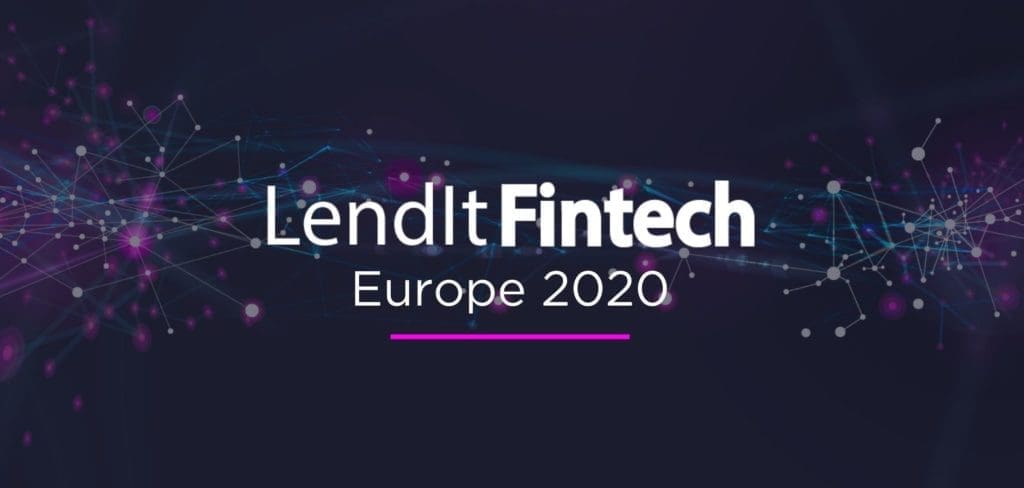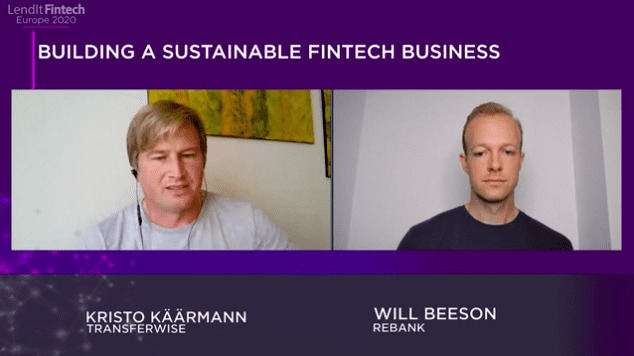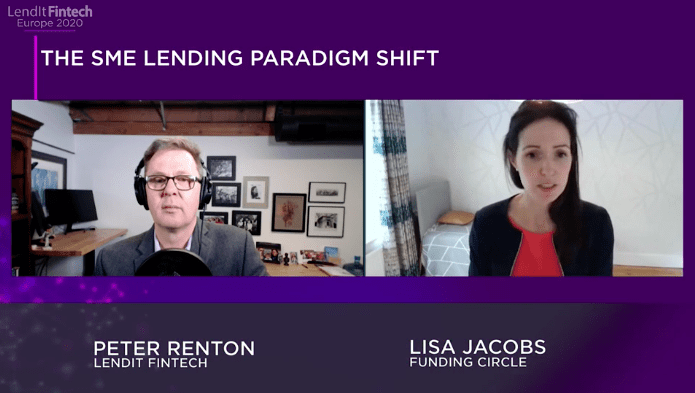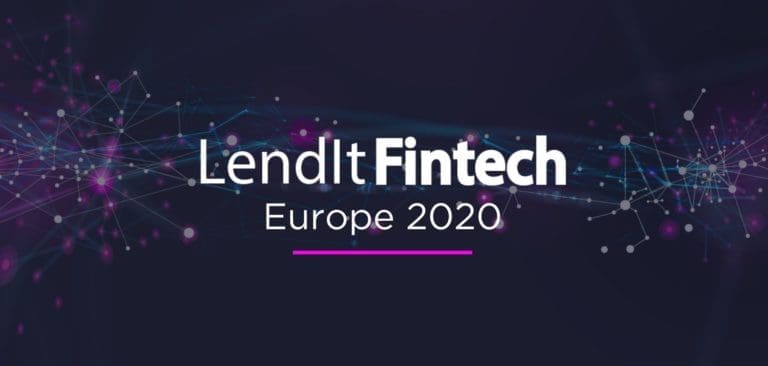
Last week the European fintech industry gathered online for the seventh annual LendIt Fintech Europe event. Like pretty much every event held in the last few months it was conducted entirely online.
We had planned on being back at the Business Design Centre in London again this year but we made the call in early June to switch to a 100% virtual event. So, on October 19 I found myself getting up at an ungodly hour in Denver so we could launch our Europe event at 10:45am London time (which happened to be 3:45am in Denver). We used the same production company as our USA event and, as we made clear to the world at that event, this was not a run-of-the-mill Zoom conference.
Now, on to some of the highlights. We had a fantastic keynote roster, it may have been our best ever, so here are some of the learnings from our esteemed keynote speaker faculty.

We kicked it off with the CEO of Transferwise, Kristo Käärmann, someone we have been trying to secure as a speaker for years. He was engaging and humble even as his company has become one of Europe’s most successful fintechs. He said that in 2015 they switched from being funded by VCs to being funded by their customers as they have not taken on any new equity capital since 2017, making a profit in each of their last four years. He talked about their commitment to reducing prices for their customers and to undertake a “journey towards zero” for the cost of their transfers. He also shared why they have decided not to get their own banking license even though they have £2 billion in deposits just in the UK.
Next up we had Sean Hunter, the CIO of OakNorth, who talked about how the rules have changed for commercial lending. They developed a Covid Vulnerability Rating very early in the pandemic to give lenders insight into their loan portfolios. The main way the rules have changed today is that lenders now need a credit model for every different industry and even analyzing sub sectors within industries because there have been such different impacts. Existing credit models that use backward looking financial data are completely broken because “they are based on assumptions that are no longer true”. He also said that banks are moving at a shockingly quick pace. He shared the story of PNC Bank (a top 10 bank by assets in the U.S.) and a call they had on a Saturday with the senior executive team and they were live 72 hours later.
Andrea Melville is the Managing Director of Commercialisation and Propositions for Transaction Banking at Lloyds Banking Group, and she discussed how a huge bank like Lloyds, that is systemically important to their customers, can not only keep up but be a leader in digital transformation. She talked about relentless incrementalism – making constant changes and pivots via a test and learn approach. There is no silver bullet, but they focus on where they can leapfrog technology. Fintechs play a key role here, they can help reduce the cost of change, not just in terms of money but in terms of time spent on implementing changes.
Charlotte Crosswell, the CEO of Innovate Finance, talked about how the different areas of fintech have fared during this difficult year. She focused on SME lenders whose business models were completely changed overnight. The fintech lenders had to go through a tough process to get approved to distribute government funds. This crisis is providing an opportunity for fintechs to demonstrate their full capabilities to help demonstrate the role they can play in economic recovery. Charlotte is encouraging the government to leverage fintechs as the UK starts to dig out from the crisis. They are gathering people around the table in a collaborative process to chart the path forward next year.
One day two, the keynotes began with Marieke Flament, the CEO of Mettle, discussing how SME bank accounts are profoundly changing. What makes Mettle different is that they are a digital bank but backed by a trusted brand, NatWest. Banks need to be able to integrate with accounting platforms but they should also strive for simplicity. SME owners are busy and they want their bank to provide guidance in a simple way that takes handling the finances off their plate. There will be a surge of business creation coming out of the pandemic that will help rebuild their local economies and they will all need a bank that helps them manage their finances.

Lisa Jacobs, the head of Funding Circle’s UK business, talked about the paradigm shift that has occurred this year in SME lending. Small business owners have applied for government loans online and have been surprised at how quick and easy the experience was. Lisa talked about how the average loan application time for CBILS loans at Funding Circle was six minutes and 40% were approved instantly. This has changed the expectations of small business owners and no longer will they be interested in visiting a branch and waiting weeks or months for their loan applications to be approved. This is going to have a profound impact on the SME lending space going forward.
The CEO of Starling Bank, Anne Boden, talked about how they pivoted quickly to provide Bounce Bank Loans in about a week as the digital banking moment has arrived. Starling Bank has grown a strong deposit base and is looking to provide a series of products for their customers and they may well acquire a company to help them expand their offerings. With the trend to digital accelerating they hired 100 people during lockdown as they took advantage of this acceleration. “Digital is now how you bank” and Anna says this has brought 20 years of change to banking in the UK. She views the competition as now Barclays and HSBC, not Monzo and Revolut.
Husayn Kassai, the CEO of Onfido, discussed the changes in digital identity that have been wrought by the pandemic. There has been a shift globally this year in that the whole concept of digital identity has gone mainstream. Digital identity is now underpinning the economy and even society. The fact that much of the world was working remotely made digital identification a necessity instead of a nice to have. Also with a highly contagious disease there is increased awareness of physical hygiene so people want to use their smartphone for their identity instead of paper-based documents. Today, your social identity has been standardized, it is Facebook, your professional identity is also standardized, it is LinkedIn, but your legal identity has not been. A company specializing is identity management will likely become a standard here but the field is still pretty open (obviously Onfido will be in contention here).
That was our keynote stage. Of course, we had multiple breakout tracks as well with some fantastic sessions. One thing I found surprising in the Online Lending Track was that there was a general sense of optimism across multiple lending verticals: consumer, SME and property. Despite the pandemic several lenders are back at or near pre-pandemic levels of lending and expect 2021 to be a record year.
The videos for every session are available online via our Brella platform until 20 November for all registered attendees.
Virtual Networking and More
We had around 500 registered attendees, most of whom logged in to the Brella app for networking. In fact, attendees scheduled over 600 meetings through Brella’s virtual networking tool and I heard from many attendees who were pleasantly surprised by the quality of the meeting they had over the two days. Our Women in Fintech Power Hour was a highlight for all who attended. And our closing Networking Roulette also proved quite popular.
As we did with our USA event we conducted the LendIt Fintech All Stars competition to reward people for setting up meetings, asking questions, interacting with sponsors, basically doing things that added to the overall experience. Points were awarded for these activities and the winner received a new iPhone 12 Pro.
I want to thank everyone involved who helped make our first virtual LendIt Fintech Europe event such a success. The entire LendIt Fintech team worked tirelessly (and woke up super early) to bring you a show that exceeded even our own high expectations. And lastly, thanks to all the attendees and sponsors for having faith in us and trusting that a virtual event can be just as good as a physical one.


